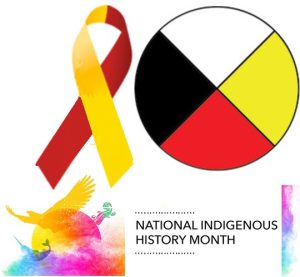 It is the unfortunate reality that Indigenous peoples in Canada have a history that is entrenched in colonization and oppression that has contributed to health disparities (Mendlowitz, Bremner, Walker, Jones, Isaranuwatchai & Krahn, 2021). Much of Canada’s historical and current institutions have negatively impacted Indigenous peoples and have been the main contributor to the prevalence of intergenerational trauma that many Indigenous peoples face to this day. As such, rates of substance use, poverty and mental health difficulties disproportionately impact the Indigenous peoples of Canada and are far too often ignored or dismissed by both the Canadian Government and healthcare systems alike (Menzies, 2020). Without addressing the ways in which Canada’s racist past and present contributes to the trauma many Indigenous peoples face, certain colonial illnesses also go unaddressed. Hepatitis C (caused by the Hepatitis C Virus/HCV) is considered a colonial illness, that is typically transmitted through contact with the blood of from a person infected with the virus (Uhanova, Tate, Tataryn & Minuk, 2013). The primary risk factors associated with HCV categorize injection drug as one of the primary concerns for contracting the virus (Mendlowitz et al., 2021). Recently, studies have found that there are higher rates of HCV diagnosis observed in Indigenous people in Canada, as opposed to non-Indigenous people in Canada (Mendlowitz et al., 2021).
It is the unfortunate reality that Indigenous peoples in Canada have a history that is entrenched in colonization and oppression that has contributed to health disparities (Mendlowitz, Bremner, Walker, Jones, Isaranuwatchai & Krahn, 2021). Much of Canada’s historical and current institutions have negatively impacted Indigenous peoples and have been the main contributor to the prevalence of intergenerational trauma that many Indigenous peoples face to this day. As such, rates of substance use, poverty and mental health difficulties disproportionately impact the Indigenous peoples of Canada and are far too often ignored or dismissed by both the Canadian Government and healthcare systems alike (Menzies, 2020). Without addressing the ways in which Canada’s racist past and present contributes to the trauma many Indigenous peoples face, certain colonial illnesses also go unaddressed. Hepatitis C (caused by the Hepatitis C Virus/HCV) is considered a colonial illness, that is typically transmitted through contact with the blood of from a person infected with the virus (Uhanova, Tate, Tataryn & Minuk, 2013). The primary risk factors associated with HCV categorize injection drug as one of the primary concerns for contracting the virus (Mendlowitz et al., 2021). Recently, studies have found that there are higher rates of HCV diagnosis observed in Indigenous people in Canada, as opposed to non-Indigenous people in Canada (Mendlowitz et al., 2021).
The inequities Indigenous peoples have faced are an unequivocal result of historical trauma and continued oppression in Canada (Uhanova et al., 2013). As a result, Indigenous-led harm reduction and HCV approaches have begun to surface across the country with the end-goal of addressing the historic trauma by using culturally competent practices that incorporate Indigenous approaches to wellness (Uhanova et al., 2013). These approaches are deeply entrenched in ideas surrounding reconciliation and resurgence (Uhanova et al., 2013). The wrongdoings of the systems that have failed the Indigenous population of Canada acknowledged, and this approach endeavours to address these maltreatments. Upon engaging in Indigenous-led harm reduction and HCV approaches, the key points of the practice include making space for Indigenous practice/language/culture, promoting autonomy, including individuals with lived experience in program formation, creating judgement free spaces and respecting individual journeys (Uhanova et al., 2013). Working towards culturally competent services for Indigenous peoples living with the Hepatitis C Virus means making an active effort to addressing reconciliation, reparations, and stigma in everyday practices. We must always remember that when providing services to Indigenous peoples, we must acknowledge our privilege and the history of racial oppression Canada holds. It is only then, that we can work towards culturally competent care.
Here at CAYR, we offer a variety of culturally competent services- one of which includes our Hepatitis C program. Run by a team of well-informed and friendly staff, our HCV program offers a safe and inclusive space for you to engage with trained support professionals. In addition to such, our program offers HCV system navigation, treatment/medication adherence support, transportation support, wellness and life skills development programs, practical/emergency assistance and more! Connect with us at [email protected] or 905-884-0613 for more information! Our office is open Tuesday-Thursday from 10am-3pm- feel free to drop by to speak to one of our staff members in person.
By Rachel
CAYR Student Placement, Addictions and Mental Health Program
References
Mendlowitz, A., Bremner, K. E., Walker, J. D., Wong, W. W. L., Feld, J. J., Sander, B., Jones,
L., Isaranuwatchai, W., & Krahn, M. (2021). Hepatitis C virus infection in First Nations
populations in Ontario from 2006 to 2014: A population-based retrospective cohort
analysis. CMAJ Open, 9(3). https://doi.org/10.9778/cmajo.20200164
Menzies, P. (2020, March 25). Intergenerational trauma and residential schools. The Canadian
Encyclopedia. https://www.thecanadianencyclopedia.ca/en/article/intergenerational-
trauma-and-residential-schools
Uhanova, J., Tate, R. B., Tataryn, D. J., & Minuk, G. Y. (2013). The epidemiology of hepatitis C
in a Canadian Indigenous population. Canadian Journal of Gastroenterology, 27(6), 336–340. https://doi.org/10.1155/2013/380963





